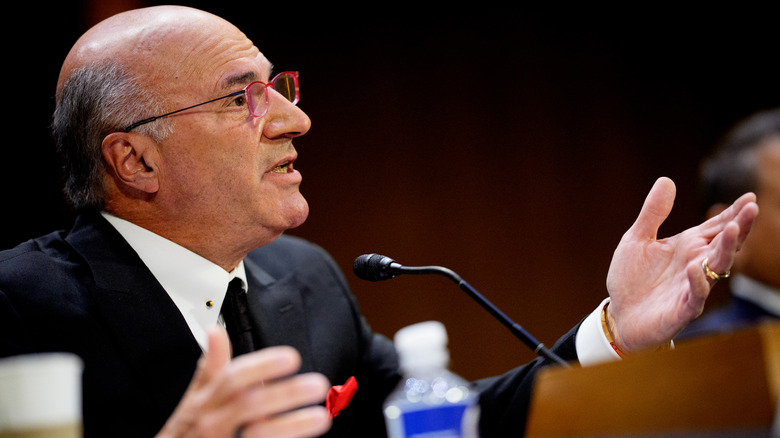Kevin O'Leary Reveals How Much Money You Need In The Bank To Live Off Interest Alone
Kevin O'Leary is known to be an outspoken member of the "Shark Tank" crew. Mr. Wonderful consistently delivers offers that pay royalties, either to himself or as an incentive for entrepreneurs to give up more equity than they might otherwise like. O'Leary focuses on cash flow, both in the benefits a deal may bring and in the underlying business financials of the people who pitch their ideas to the panel. For this reason, it's not surprising that the shark has thought long and hard about interest rates, building income replacement streams, and dividends. His royalty deals are essentially dividend payments made in another format, after all.
The concept of this approach to investing is simple: Rather than selling stocks to extract cash, companies pay a quarterly, yearly, or even monthly dividend to shareholders. This allows you to take some money out of the investment without selling your position. The interest you receive from a savings account works in much the same way, and in 2023 O'Leary talked about this in a YouTube Short. He suggested that a principal balance of around $500,000 could potentially offer enough interest to curtail the need to work.
He framed this around comfortability, however. Half a million dollars is a lot of money, but it can be leveraged to great effect in driving growth, or as a means to protect your principal while offering more modest returns. It's also important to note that Americans estimate an income level of $186,000 to live comfortably.
It's all relative, according to O'Leary
Kevin O'Leary begins his assessment with a caveat. "It's all about lifestyle," he says. Diligent savers who have amassed $500,000 in their investment accounts can park all that cash in a high interest savings account and earn roughly 5% on their balance (a little over the best options on the market today), he notes. Although, savings accounts can be one of the worst places to keep your money, if you aren't maximizing your yield. Specifically, a $500,000 savings account earning 5% would net a monthly interest payout of just under $2,100. That's enough to cover plenty of expenses for someone who is willing to live on a stringent budget.
People seeking to retire in their 30s, for instance, might build up as much capital wealth as they can early on in their career. For a high volume saver starting work in a full-time job right out of high school, it's not impossible to reach this kind of milestone. But the tradeoff is one that not all consumers will be ready to make. Keeping your money in this kind of savings vehicle offers protection and a steady stream of notable income, but it's not for everyone.
Instead, O'Leary also says that more adventurous investors should put that cash in equities, which can yield up to 9% annually. You'll certainly have less dividend production this way, so it may not yield a true income replacement solution, but that extra growth potential will allow for a much larger principal volume to support increased monthly yields later on.

